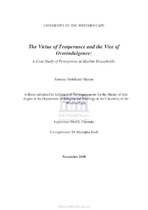| dc.description.abstract | Overindulgence is widely regarded as a serious social problem in South Africa leading to obesity and associated medical and psychological issues. This study investigated overindulgence from the perspective of Islamic Studies. In the Muslim tradition, overindulgence is regarded as a vice which is contrasted with the virtue of temperance in the Qur’an and the Hadith. There is a long tradition of Muslim virtue ethics that draws from Greek philosophy but also from medieval Arabic sources. This study required an overview of such literature in order to profile contemporary discourse on the virtue of temperance against this historical background.
Even though the virtue of temperance is praised, and the vice of overindulgence is frowned upon in Muslim communities, this does preclude overindulgence amongst Muslims, not even in the holy month of Ramadan. This may be understood in terms of the classic problem of moral formation where it is recognised that virtue cannot be taught. Knowledge of the good does not suffice for the realisation of the good. In terms of this study, this begs the question what kind of considerations play a role in motivating some Muslims to overindulge despite Muslim teachings in this regard, even amidst contexts of food insecurity.
In this study, I investigated the perceptions of such considerations found within Muslim households associated with the Rylands and Belhar mosques. This required a Qualitative Approach where Semi-structured Interviews were conducted with around 10 households associated with each of these mosques. The local Imam in each case was asked to select ten such households of good moral standing. These interviews were recorded and analysed in order to describe the perceptions amongst Muslims of good moral standing with regards to the considerations that play a role in habits of over-indulgence.
The study found several determinants of overindulgence within the selected Muslim households associated with the Rylands and Belhar mosques namely, food insecurity, spiritual apathy, emotional eating, conspicuous and hedonistic consumption as well as social environmental cues. However, food insecurity was exclusive to the Muslim community of Belhar who are distinctive from the inhabitants of Rylands in terms of social-economic status as well as race. This community is largely of Malay origin and is disadvantaged economically compared to their counterparts who are predominantly of Indian descent and enjoy a high-income status.
The study found in both communities that Ramadan; a month of restraint, self-reflection, devotion, and worship had been turned into a month of indulgence and unhealthy eating. It was perceived that most Muslims squeeze a five-course meal in the few hours they can eat. The research further revealed that such individuals to be very meticulous of what type of food they consume when breaking their fast and would prefer oily fried foods to healthy food. This causes weight gain, health complications and sluggishness which stands in the way of worship. It was concluded that the majority gain weight due to their lifestyles.
With regards to the implementation of moral formation, the study revealed self-discipline, leading by example and parents, educators and leaders playing an active role to be key in the formation of good morals. Additionally, the study found good moral formation can be achieved through habituation.
Finally, the study found that the major constraints to moderate and healthy eating to be lack of self-discipline, the absence of virtue ethical education in Islamic institutions and finally Muslim leaders have prioritized the ḥalãl aspect of food and in the interim have forgotten to preach the importance of wholesome pure foods.
The explanations offered in this study indicated the importance of the virtue of temperance in the fight against obesity and in the attainment of physical and spiritual wellbeing. This virtue which is a mean between two vices, namely self-indulgence and insensibility help in the journey towards a higher lifestyle and helps release all the dynamic forces that spiritually weigh down those in affluent as well as food insecure communities. | en_US |

